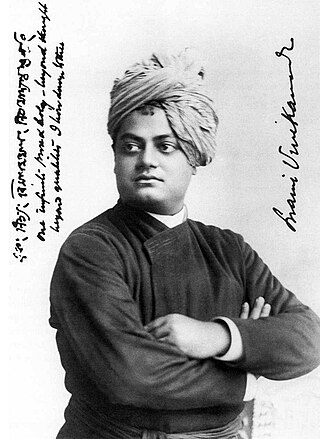
Swami Vivekananda, born Narendranath Datta, was an Indian Hindu monk, philosopher, author, religious teacher, and the chief disciple of the Indian mystic Ramakrishna. He was a key figure in the introduction of Vedanta and Yoga to the Western world, and the father of modern Indian nationalism who is credited with raising interfaith awareness and bringing Hinduism to the status of a major world religion.
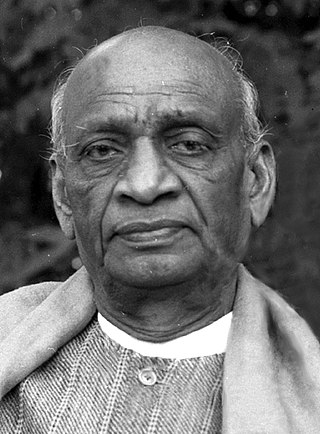
Vallabhbhai Jhaverbhai Patel, commonly known as Sardar Vallabhbhai Patel, was an Indian independence nationalist and barrister who served as the first Deputy Prime Minister and Home Minister of India from 1947 to 1950. He was a senior leader of the Indian National Congress, who played a significant role in the country's struggle for independence and its political integration. In India and elsewhere, he was often called Sardar, meaning "Chief" in Hindi, Urdu, Bengali and Persian. He acted as the Home Minister during the political integration of India and the Indo-Pakistani War of 1947.
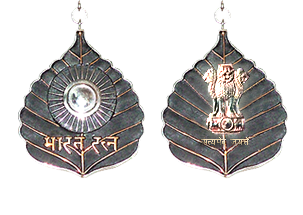
The Bharat Ratna is the highest civilian award of the Republic of India. Instituted on 2 January 1954, the award is conferred in recognition of "exceptional service/performance of the highest order", without distinction of race, occupation, position or gender. The award was originally limited to achievements in the arts, literature, science, and public services, but the Government of India expanded the criteria to include "any field of human endeavor" in December 2011. The recommendations for the award are made by the Prime Minister to the President. The recipients receive a Sanad (certificate) signed by the President and a peepal leaf-shaped medallion with no monetary grant associated with the award. Bharat Ratna recipients rank seventh in the Indian order of precedence.

Ravishankar Vyas, better known as Ravishankar Maharaj, was an Indian independence activist, social worker and Gandhian from Gujarat.
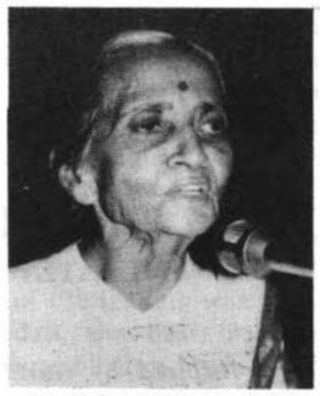
Usha Mehta was a Gandhian and freedom fighter of India. She is also remembered for organizing the Congress Radio, also called the Secret Congress Radio, an underground radio station, which functioned for few months during the Quit India Movement of 1942. In 1998, the Government of India conferred on her Padma Vibhushan, the second highest civilian award of the Republic of India.

P. Parameswaran, often referred to as Parameswarji, was a Rashtriya Swayamsevak Sangh (RSS) pracharak from Kerala, India who was erstwhile Vice‑President of the Jan Sangh.

Satya Vrat Shastri was an Indian Sanskrit scholar, writer, grammarian and poet. He wrote three Mahakavyas, three Khandakavyas, one Prabandhakavyas and one Patrakavya and five works in critical writing in Sanskrit. His important works are Ramakirtimahakavyam, Brahattaram Bharatam, Sribodhisattvacharitam, Vaidika Vyakarana, Sarmanyadesah Sutram Vibhati, and "Discovery of Sanskrit Treasures" in seven volumes.
The Institute of Advanced Studies in Education (IASE) is a deemed university in Sardarshahar, Rajasthan, India. The university is accredited as a "B+" institute by the NAAC.it is located in Churu District of Rajasthan.Iase is a deemed university recognised by ugc under section u/s 3 of ugc act-1956vide notification by MHRD no f.9-29/2000-u.3.Govt.of India. iase university is affiliated by govt.of India, MHRD notification on declaring the institute as Deemed to be University under f.9-6/81-u.3 dated 25 October 1983. IASE University's registrar is Dr.Dharm Singh Gehlot.
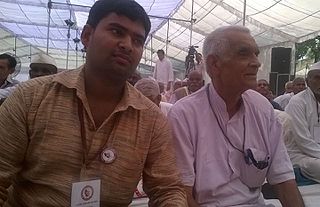
Ramjee Singh is a former Member of Parliament and vice-chancellor of Jain Vishva Bharati University. He is an eminent Gandhian and is the author of a number of books on him. He was also the director of Gandhian Institute of Studies, Varanasi, India. In January 2020 he was awarded the fourth highest civilian award in the country: The Padma Shri for Social Work. His life has been a blend of being a Gandhian academician as well as an activist. Singh has declared Mahatma Gandhi as the Bodhisattva of the 20th century.

Eknath Ramakrishna Ranade was a social activist and right-wing leader. He joined the Rashtriya Swayamsevak Sangh (RSS) when in school and was its general secretary from 1956 to 1962.
Hindu nationalism has been collectively referred to as the expression of social and political thought, based on the native spiritual and cultural traditions of the Indian subcontinent. "Hindu nationalism" is a simplistic translation of हिन्दू राष्ट्रवाद. It is better described as "Hindu polity".
Gopaldas Ambaidas Desai (1887–1951) also called Darbar Gopaldas Desai was a prince who ascended the throne of the State of Dhasa in Saurashtra and a noted Gandhian political and social activist. He is remembered as the first prince in India who gave up his principality to become a freedom fighter against the British Raj.

Neo-Vedanta, also called Hindu modernism, neo-Hinduism, Global Hinduism and Hindu Universalism, are terms to characterize interpretations of Hinduism that developed in the 19th century. The term "Neo-Vedanta" was coined by German Indologist Paul Hacker, in a pejorative way, to distinguish modern developments from "traditional" Advaita Vedanta.

Jugatram Chimanlal Dave (1892–1985) was a Gandhian social activist, freedom fighter and author from Gujarat, India who is remembered for his social work among the tribals of southern Gujarat.

S. P. Varma is a social worker and peace activist from Jammu and Kashmir. He has been actively involved in peace-building efforts in conflict-ridden areas of the Kashmir valley.
Sare Jahan se Accha is a pencil sketch mural in Ahmednagar city in Maharashtra, India. It was created in the year 1997. The sketch was drawn by Pramod Kamble, who is a painter and sculptor. He created it as a tribute to the nation on the occasion of 50 years of independence. It was painted on the specially-prepared wall of Mahavir Art Gallery in Ahmednagar. Kamble has portrayed Bharat Mata and 500 great people born out of Indian culture. It is said to be the world's biggest pencil sketch. This is the only fixed asset in India which was made as a part of India's 50th Independence day celebration.
Padmanabha Pillai Gopinathan Nair was an Indian social worker, Gandhian, independence activist, and the chairman of Mahatma Gandhi National Memorial Trust. He participated in the Quit India movement of 1942 and worked alongside Vinoba Bhave to promote Bhoodan and Gramdan movements. He was the initiator of the camp movement, a student program that was part of the Construction Movement of Mahatma Gandhi. He was a recipient of the Jamnalal Bajaj Award, among other honors. The Government of India awarded him the fourth highest civilian honour of the Padma Shri, in 2016, for his contributions to society.
The Gandhi Peace Foundation is an Indian organisation that studies and develops Mahatma Gandhi's thought.
















